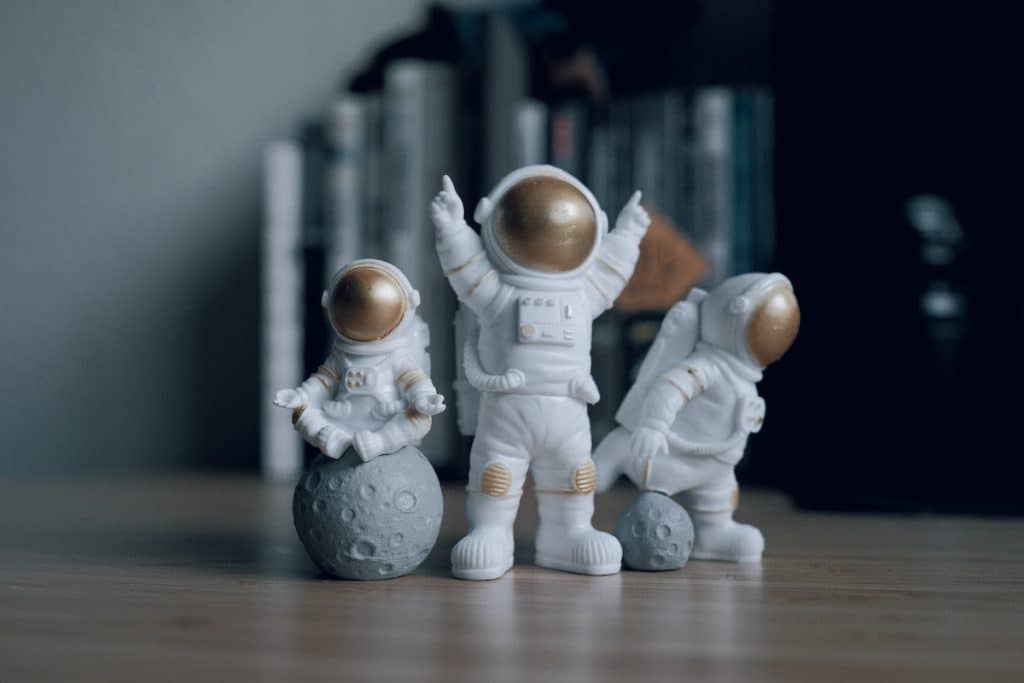Table of Contents
There’s nothing quite like looking up at night, and being greeted with a sky full of stars. From below, space seems like such an exciting and mysterious place, especially because only a select few get to explore the galaxies.
No matter how peaceful it may seem, working in space is a high-stress, high-pressure environment; astronauts face both extreme physical and mental health challenges in their work. In this article, we explore the strategies that astronauts use to protect their mental health, and how we can apply these to our daily lives as well.
The Mental Health Challenges of Space
Only the best of the best are selected to be astronauts. That’s for a good reason! Space is a terribly harsh environment, and it takes a special type of individual to do well there. On top of physical challenges, astronauts also need to learn how to cope with many challenging psychological factors too. These are just a few of them:
Dealing with Isolation and Confinement
It’s costly to send a team into space; once a team is up, their mission period may last a long while, given the amount of resources invested in their success. As such, astronauts often go on months-long (years-long, for some) missions, and spend the entire period living in close quarters with each other.
No matter how well-designed their living space can be, there is still a finite amount of space they can wander around in the space centre. This can take a significant psychological toll, as it can become stiflingly claustrophobic, with a certain lack of privacy. The seeming lack of ‘freedom’ in physical movement and the isolation of space can cascade into serious mental health challenges, like depression, if not properly managed.
Coping with the Long Distance
If you’ve studied or worked overseas for an extended period, you would know the bittersweet feeling of homesickness. This feeling is even worse if you’re living in a timezone that’s flipped from your home country, and it’s hard to coordinate a time to speak to your loved ones.
Being in space is an extreme version of this. It’s astronomically difficult for astronauts to speak to their family that’s based on Earth. They have to cope with the psychological burden of being away from their loved ones for such a long period, missing important occasions and milestones. Catching up with one’s family isn’t as easy as catching the next flight back home – committing to a mission means staying up in space for the entire time, and knowing that you’ll be permanently away from home for a long, long while.
Handling the High Stress
Space is an environment that is incredibly hostile to human life. Any mistake can be a fatal one — and this can take a toll in terms of psychological pressure. They have to be constantly aware of what they’re doing, and focused on their work.
Furthermore, astronauts have an intense workload, with multiple projects and tasks they have to accomplish on a strict schedule. It can be hard for astronauts to completely disconnect from work too, given that they’re unable to leave their ‘place of work’.
Experiencing the ‘Overview Effect’
On the flipside, being in space can have a positive transformative effect on astronauts as well. This is most exemplified in the Overview Effect, which describes the emotional reaction of seeing our planet from high above in space; where you can see the Earth in full, suspended amongst the darkness of space.
It’s a cognitive shift that many astronauts have reported experiencing; and many say they leave with a sense of wonder and transcendence, and a deeper connection with humankind. The transformative impact of this is seen with how many astronauts turn towards pro-social causes after they return to Earth.
Mental Health Strategies used by Astronauts
As part of their intensive training pre-flight, astronauts are equipped with mental health strategies to help them cope with the stressors of space. These include:
Emphasising Peer Support Mechanisms
Conflict Resolution: Studies have shown that long periods in artificial gravity may affect our ability to read emotional cues from others. This can be disastrous, with an astronaut’s tight living quarters and collaborative tasks. As such, before they leave for their missions, astronauts are trained in various ways to deal with inter- and intra-personal conflict, to ensure their team dynamics stay strong and intact.
Team Bonding: A key aspect of NASA’s Human Research programme is looking into how to better support astronauts’ health and wellness when they’re in space. With the benefits of strong social bonds between the crew, they are actively looking into how meaningful work can bring teams together. A surprising discovery is in the area of food. For example, astronauts reported a sense of fulfilment and satisfaction from the act of growing food together, and this can be an option for a team-bonding activity.
Connection with Earth: Astronauts are able to phone and write to their loved ones on Earth – some even have Twitter accounts, where they tweet from space. Ensuring they have a reliable line of communication to Earth can help to decrease their sense of isolation, and help them feel connected with their loved ones. Plus, the space missions often arrange for family members to send their loved ones care packages when they’re in space.
Similarly, for us, having peer support is important for our own mental health. Humans are not built to be solitary creatures, and we need to know that we have a team we can depend on. While we’re not in as perilous an environment as space, having close friendships can be a source of strength, particularly if we’re struggling with our emotions.
Incorporating Healthy Lifestyle Routines
Hobbies and Recreation: A work-life balance is more important than ever when you live where you work. An astronaut’s schedule is carefully planned to ensure they have more than adequate time to decompress from work. Some popular recreational activities include journaling, learning a musical instrument, or just watching the Earth from above. You can also try adopting these activities, if you need ideas on how to decompress after work. Exploring new interests in your own life can introduce a sense of novelty and purpose, and can help to shift your mood.
Sleep Routine: As there is no regular day-night cycle in space, an astronaut’s circadian rhythm may be disrupted; this can lead to sleep disruptions and poor health. A consistent routine ensures they get their recommended amount of quality sleep — similar to how a pre-sleep routine and consistent sleep hours can help us to fall asleep easier at night.
Getting Professional Support
Leaning on Experts: Astronauts have ready access to a doctor or mental health expert, if they need professional advice on their physical or mental health. While not every mission has a live onboard psychologist, they’re able to connect with one quite easily through a video-call. The astronauts can lean on these mental health experts for help with stress management, concerns and worries, and even get help with resolving conflicts within the crew.
Speaking to a professional can help us tremendously in our own lives too. We don’t need to be facing huge issues to benefit from an appointment with a mental health expert. A mental health professional can provide us with guidance on our personal growth, help us develop better stress and coping mechanisms, and pick up strategies to thrive in our daily life.
If you’re considering speaking to a mental health expert, we’re here to help you through the process. Get matched with a suitable expert through our client-matching service, or browse our therapist directory to learn more about the professionals who work with A Space Between.
References:
- https://www.nasa.gov/hrp/
- https://www.ncbi.nlm.nih.gov/pmc/articles/PMC8696290/
- https://www.plugandplaytechcenter.com/resources/how-mental-health-astronauts-affected-space
- https://cmsw.mit.edu/angles/2019/headspace-how-space-travel-affects-astronaut-mental-health/
- https://www.asc-csa.gc.ca/eng/youth-educators/toolkits/mental-health-and-isolation/how-astronauts-take-care-of-their-mental-health-in-space.asp
- https://edition.cnn.com/2022/06/04/world/longterm-spaceflight-cognition-emotions-life-itself-scn/index.html
- https://time.com/6084094/overview-effect/
- https://www.theatlantic.com/magazine/archive/2023/01/astronauts-visiting-space-overview-effect-spacex-blue-origin/672226/
- https://www.sciencedirect.com/science/article/abs/pii/S0094576517316855
- https://www.smithsonianmag.com/science-nature/how-do-astronauts-spend-their-weekends-space-180977480/
- https://www.nasa.gov/humans-in-space/isolation-what-can-we-learn-from-the-experiences-of-nasa-astronauts/
- https://www.ucl.ac.uk/news/2023/jan/space-travel-lonely-business-how-can-space-psychologists-make-it-better#:~:text=It’s%20the%20job%20of%20space,overload%2C%20and%20likely%20develop%20fatigue.

An experienced health & wellness writer, I am a story-teller at heart. For me, writing is a way of weaving together the little details that make our existence meaningful and significant into a beautiful, larger story.




